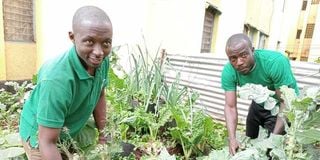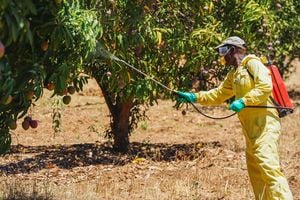
Kevin Uduny and an H-Town Youth Group member tend to vegetables.
After the violence that followed the disputed 2007 presidential election, Kevin Uduny formed a group to unite young people.
“Five of us started a merry-go-round. As months passed, we thought of doing other things. Someone suggested farming,” he says.
The 30-member H-Town Youth Group in Huruma estate, Nairobi, rears dairy goats, chickens, geese, pigeons, ducks and rabbits. It also grows vegetables. The group got funding from the EU to build a chicken coop in 2010. “All the 50 chickens we bought in September died. We wanted to sell them in December. Later, we bought improved Kienyeji chickens, which are resistant to diseases. They don’t require much labour,” Uduny says.
The group gets most of the birds’ feed from households. “We give them ugali, rice and chapati leftovers. We have 56, having sold many during Easter,” he says, adding that the birds give two to three trays of eggs daily.
Uduny and group members look out for diseases like Newcastle, Gumboro and fowl typhoid. H-Town Youth Group also has five geese, around 70 pigeons and 15 ducks.
The group went into dairy goat farming in 2014, starting with local breeds. To get the goats, H-Town Youth Group applied for a loan from Njaa Marufuku Fund. It now has Saanen and Alpine females and a Toggenburg buck. The number had risen to 32 when the group sold 14 goats. A four-month-old dairy goat goes for Sh6,000 to Sh10,000. A ready-to-be served goat is Sh12,000 to Sh15,000, and a fully mature one goes for Sh25,000 to Sh30,000.
The group buys a bale of hay mixed with Lucerne at Sh400 to Sh600 for the goats, which are fed three times a day. The group also buys dairy meal for the goats.
Uduny says dairy goats don’t require a lot of space, and rearing them is cheaper than cows. A goat produces up to three litres of milk a day, with a litre going for Sh200. A customer in Parklands buys six litres every week, while H-Town Youth Group also make cheese for a customer. They sell 100g of cheese for Sh300. In the case of milk glut, the group makes yoghurt.
The main challenge in keeping goats is diseases. To ensure their goats are healthy, a vet is usually called to attend to sick goats and they also administer injections and deworm the animals.
An important element that has helped the group, as in any business, is good record-keeping to track inputs and outputs. The group does this to monitor not just the goats but all their ventures.
H-Town Youth Group also rears rabbits where the main challenge is the rabbit ear cancker disease. They had earlier tried a guinea pigs venture, but it was not successful.

Kevin Uduny in Huruma, Nairobi.
A few years ago, H-Town Youth Group was introduced to growing sukuma wiki, spinach, amaranth, black nightshade, spider plant, Jute mallow and other vegetables.
It embraced conical gardening because of the space factor. “There are six conical gardens, each having 300 to 400 plants,” Uduny says, adding that they use droppings and urine from their animals as manure.
The H-Town Youth Group also has a water vending stall, and it recently started table banking with the aim of buying land.
Uduny says group members have been trained on good farming practices by the Ministry of Agriculture, and now also trains other youth groups and urban farmers.
“Three years ago, we partnered with an organisation called Korea Safety, Health and Environment that facilitated us with training and stationery. We incorporated 30 other groups in Mathare. The ministry, Somo Africa and Mazingira Institute were also involved. We seek their assistance as they are involved in research,” he says.







